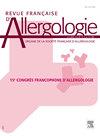Histoire naturelle des allergies alimentaires non IgE-médiées
IF 0.3
4区 医学
引用次数: 0
Abstract
Non-IgE-mediated food allergies are adverse immune reactions to certain food allergens that are specific for a given individual, but do not involve specific serum IgE antibodies. They mainly affect infants and young children. They include allergic proctocolitis, food protein-induced enterocolis syndrome (FPIES), allergic enteropathy, aspecific digestive dysmotility (e.g., severe reflux, constipation) and certain eosinophilic oesophagitis (EoE) responding to the avoidance diet. The most common allergen involved is cow's milk, but other foods may be responsible, particularly in breast-fed infants, although this is rare. The main symptoms are haematochezia in allergic proctocolitis, acute vomiting with pallor and hypotonia in FPIES, stunted growth and chronic diarrhoea in allergic enteropathy, and reflux with feeding difficulties in infantile EoE. Eviction-reintroduction of the suspected allergen is used as a diagnostic test in allergic proctocolitis and enteropathy. In FPIES, there is a clinical definition. For EoE, histological analysis of oesophageal biopsies makes the diagnosis after elimination of differential diagnoses. Treatment involves avoiding the allergen responsible until tolerance is acquired. With the exception of EoE, the course of the disease is favourable in the first 2–3 years of life. There is a risk of developing functional intestinal disorders and atopic diseases. EoE is a chronic disease, with possible cases of remission in paediatrics. The main complications are oesophageal stenosis, food impaction and oesophageal perforation.
非 IgE 介导的食物过敏自然史
非 IgE 介导的食物过敏是指对某些食物过敏原产生的不良免疫反应,这种反应对特定个体具有特异性,但不涉及特异性血清 IgE 抗体。它们主要影响婴幼儿。它们包括过敏性直肠结肠炎、食物蛋白诱发肠结肠综合征(FPIES)、过敏性肠病、特异性消化道运动障碍(如严重反流、便秘)以及某些嗜酸性粒细胞性食道炎(EoE),这些病症都会对忌口饮食产生反应。最常见的过敏原是牛奶,但其他食物也可能是诱因,尤其是母乳喂养的婴儿,不过这种情况很少见。主要症状包括:过敏性直肠结肠炎的血性便秘、急性呕吐伴面色苍白和肌张力低下(FPIES)、过敏性肠病的发育迟缓和慢性腹泻,以及婴儿肠易激综合征的反流和喂养困难。在过敏性直肠结肠炎和肠病的诊断试验中,可采用驱逐-再引入可疑过敏原的方法。FPIES 有临床定义。对于肠易激综合征,食道活检组织学分析可在排除鉴别诊断后做出诊断。治疗包括避免接触致病过敏原,直到获得耐受性。除咽喉炎外,该病在出生后的头 2-3 年病程较长。但有患功能性肠病和特应性疾病的风险。肠易激综合征是一种慢性疾病,在儿科有可能缓解。主要并发症是食道狭窄、食物嵌塞和食道穿孔。
本文章由计算机程序翻译,如有差异,请以英文原文为准。
求助全文
约1分钟内获得全文
求助全文
来源期刊

Revue Francaise d Allergologie
Medicine-Immunology and Allergy
自引率
33.30%
发文量
349
期刊介绍:
La Revue Française d''Allergologie : un véritable forum pour faire connaître des travaux originaux et permettre la diffusion de l''information auprès de toutes les spécialités concernées par les pathologies allergiques. La Revue Française d''Allergologie (8 numéros par an) est au carrefour de nombreuses spécialités - dermatologie, pédiatrie, ORL, pneumologie, ophtalmologie, médecine interne - qui, toutes, ont à traiter des maladies allergiques. Les symptômes des allergies fondés sur des mécanismes communs sont le plus souvent associés et se succèdent chez un même patient. En forte progression depuis 20 ans, les maladies allergiques sont dans l''attente de perfectionnements et d''avancées thérapeutiques qui permettront aux nombreux patients qui en sont atteints de mieux vivre avec leurs allergies. La Revue Française d''Allergologie se veut donc un véritable forum de discussions et d''échanges entre tous les spécialistes confrontés aux pathologies
 求助内容:
求助内容: 应助结果提醒方式:
应助结果提醒方式:


